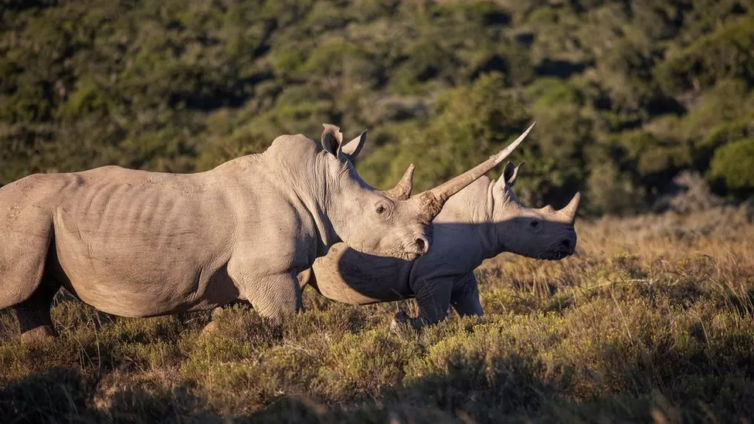Conservation group African Parks plans to release 2,000 southern white rhinos into the wild after buying the world's largest private captive rhino breeding operation in South Africa.
The giant animals, the second-largest land mammal, are considered to be under extreme pressure due to poaching.
There are thought to be 18,000 southern white rhino left. They are classified as a near-threatened subspecies.
African Parks hopes to "rewild" the animals over the next 10 years.
The group secured emergency funding to buy the financially struggling 7,800-hectare (19,000-acre) rhino farm, known as Platinum Rhino, in South Africa's North West province, after owner John Hume put it up for sale in April.
African Parks' project marks one of the largest continent-wide rewilding programmes undertaken for any species.
CEO Peter Fearnhead said they initially had no intention of owning of a captive rhino breeding operation however they "fully recognise the moral imperative of finding a solution for these animals, so that they can once again play their integral role in fully functioning ecosystems".
The organisation says it plans to release the rhinos into secure, well-managed areas to protect them from poaching and it will work with funding partners, governments and other conservation groups to ensure this happens.
Mr Hume has received recognition as a conservationist however, he has also faced criticism for advocating the trade in rhino horn. He has argued that the trade was necessary to safeguard his rhinos from poaching and raise funds to sustain the farm.
The southern white rhino population plummeted to an all-time low of 30 to 40 animals in the 1930's however through effective conservation measures, the numbers surged to more than 20,000 in 2012.
There are only two surviving members of the other subspecies, the northern white rhino - both female and both in Kenya. It is thought that rhino-horn poaching brought about their near extinction.
Most of the southern white rhinos are found in South Africa, Namibia, Zimbabwe, and Kenya.
The International Union for Conservation of Nature says a species is "near-threatened" when it is thought it could be vulnerable in the near future.
Latest Stories
-
OSP rebuts Gyampo’s ‘vendetta’ allegation over investigation into Ofori-Atta
46 minutes -
Ukraine still holds ground inside Russia’s Kursk, commander says
1 hour -
Nkwanta South MCE pays courtesy call on national Chief Imam, seeks prayers for peace
2 hours -
Kwasi Sibo helps power Real Oviedo to LaLiga promotion after 24-year wait
2 hours -
Broadcast and Build: How 2 of Ghana’s leading media giants are driving a bold socio-economic reset through strategic trade fairs
2 hours -
Actress Kalsoume Sinare named Ghana’s ambassador to Spain
3 hours -
Nkyinkyim says band music pays, but only with proper investment
4 hours -
Ecobank-JoyNews Habitat Fair: Day 3 promises mouth-watering discounts and great sales
4 hours -
Parents now request music lessons for their children from us – Nkyinkyim band
4 hours -
Arthur K slams NPP for ‘acting in the interest of a small cabal’
4 hours -
Veronica Kumi Yeboah Organises Career Guidance Fair for Students in Tano North
4 hours -
World Refugee Day: Ghana, three others host 160,000 refugees and asylum seekers – EU
4 hours -
Trump calls US strikes on Iran’s nuclear facilities ‘spectacular success’
4 hours -
Asantehene’s son to chart future in Astronomy at Wesleyan University
5 hours -
Mpox crisis: 71% of cases concentrated in Western Region
5 hours

